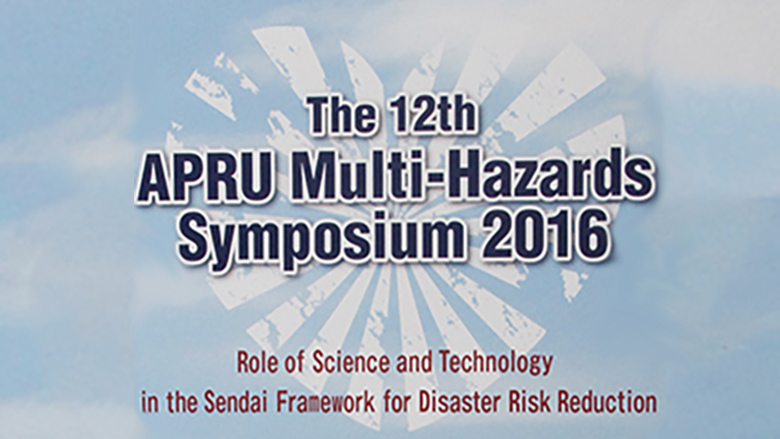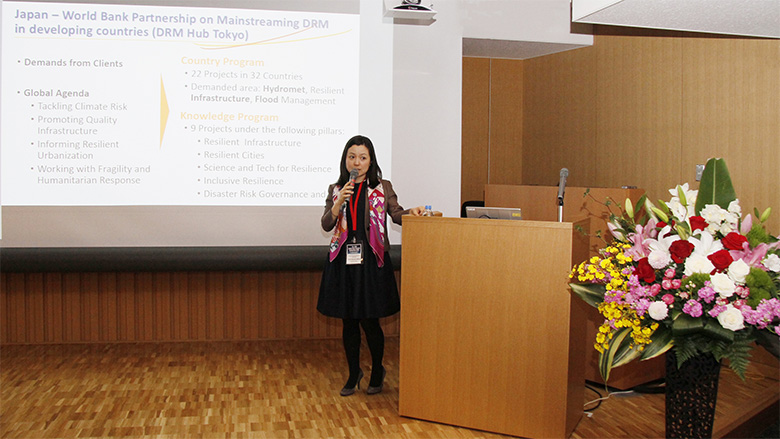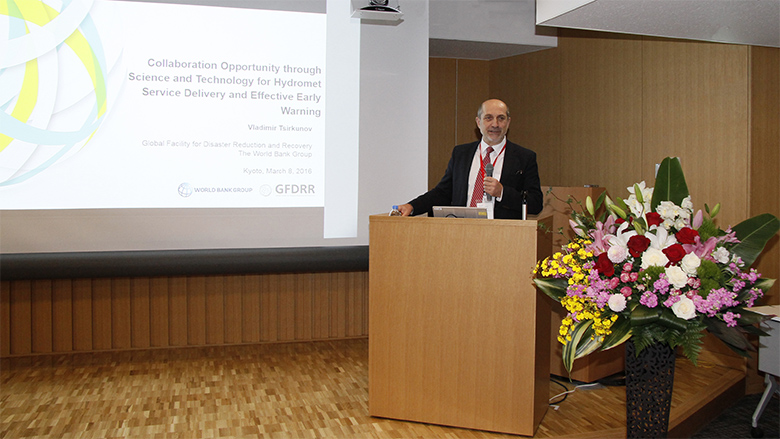The 12th APRU Multi-Hazards Symposium 2016 was held March 7-8, 2016 in Kyoto, Japan, organized by Kyoto University. The Association of Pacific Rim Universities (APRU) is composed with a network of 45 premier research universities around the Pacific Rim region. This series of annual symposium is supported by the APRU-IRIDeS Multi-Hazard Program which focuses on disaster risk reduction.
The two-day symposium was composed of 6 sessions, each focused on different aspects of disaster risk management. Keiko Sakoda Kaneda, Disaster Risk Management Hub, Tokyo, Global Facility for Disaster Reduction and Recovery (GFDRR), World Bank, and Vladimir Tsirkunov, Lead Specialist, Global Facility for Disaster Reduction and Recovery (GFDRR), World Bank were brought as presenters of the “Partnership of Academia and Stakeholders” session.
World Bank’s Partnership with Universities and Research Institute for Resilience
The World Bank’s portfolio in disaster risk management (DRM) has been growing in recent years. DRM related funding accounted for more than 12% (US$5.6 billion) of overall World Bank approved commitment in FY2015. The World Bank continues to mainstream DRM into key investments and broader development planning. Under the Japan-World Bank Program for Mainstreaming DRM in Developing Countries, DRM Hub, Tokyo accelerates in various aspects of development agendas, leveraging Japanese knowledge, expertise and technology. One of the core partners for the Hub is centers of excellence in Japan that includes academic society.
Keiko Sakoda Kaneda, Disaster Risk Management Specialist delivered a presentation, “World Bank’s Partnership with Universities and Research Institute for Resilience”. Ms. Kaneda introduced the World Bank’s collaboration cases with Japanese universities, alongside with other global examples of operational collaboration as well as joint capacity building efforts with academic institutions. She also presented unique opportunities for the universities in Japan and developing countries through the Japan-World Bank Program.
Collaboration Opportunity through Science and Technology for Hydromet Service Delivery and Effective Early Warning
Extreme weather events including hurricanes, heat waves, cold waves, windstorms, floods, and droughts cause significant economic damage and loss of life and society. Weather events, as well as longer-term trends in weather, influence economic development, food security, and health. Strengthening weather, climate, and hydrology information and decision support systems will be a key aspect of promoting sustainable development, including cost-effective adaptation to weather and climate extremes. Weather, climate, and hydrology forecasts and other information products help to minimize risk in all sectors, and are used for decision-making in agriculture, water resources management and irrigation, transport, public health, and environmental management, among other sectors. Hydromet is a fast growing demanded area of assistance under the World Bank and GFDRR portfolio, and is one of the potential areas that scientific research community can make substantial contribute.
Vladimir Tsirkunov, Lead Specialist presented the “Collaboration Opportunity through Science and Technology for Hydromet Service Delivery and Effective Early Warning”, explaining about increasing demand of hydromet investment in order to develop resilience in disaster-prone countries, and how GFDRR and DRM Hub, Tokyo are tackling with it. Followed by the overview of World Bank initiatives, he described potential of academia contribution for improving hydromet services with required technical sciences, engineering and ICT to generate reliable communication systems, analytical support and knowledge management.
Speakers
Keiko Sakoda Kaneda
Disaster Risk Management Specialist, Disaster Risk Management Hub, Tokyo, Global Facility for Disaster Reduction and Recovery, World Bank
"World Bank’s Partnership with Universities and Research Institute for Resilience" PDF
Vladimir Tsirkunov
Lead Specialist, Global Facility for Disaster Reduction and Recovery, World Bank
"Collaboration Opportunity through Science and Technology for Hydromet Service Delivery and Effective Early Warning" PDF



